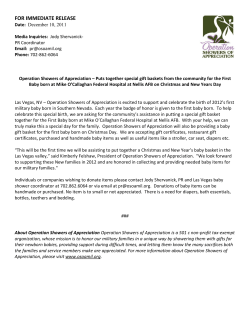
T C P
THE CENTER FOR PRENATAL PEDIATRICS www.prenatalpediatrics.org Understanding Omphalocele WHAT IS OMPHALOCELE? Omphalocele is a birth defect in the abdomen, and is often referred to as a “ventral wall defect.” Babies with omphalocele are born with some of their abdominal organs protruding out of the body through an opening in the abdominal muscles at the bottom of the umbilical cord. These organs are covered by a clear sac. The omphalocele can be small, containing only a part of the small intestines, or it can be quite large, with most of the abdominal organs, including liver, spleen, and large and small intestines; these are known as “giant” omphaloceles. Up to 70% of babies with omphalocele also have other birth defects as well, most commonly in the heart, spine, intestines, and urinary system. Thirty percent have a chromosome abnormality such as Trisomy 18. Omphalocele can also be part of a syndrome like BeckwithWiedemann (omphalocele, large body size, large tongue, enlarged intestinal organs, and severe newborn hypoglycemia) or Pentalogy of Cantrell (omphaloecele, defects in the sternum and diaphragm, and lesions in the heart). HOW COMMON IS OMPHALOCELE AND WHAT CAUSES IT? Omphaloceles that contain only a part of the small intestines are seen in 1 of every 5,000 newborns. Giant omphaloceles are less common, around 1 in 10,000 births. The cause of omphalocele is still unknown, though it is believed to occur at 3 to 4 weeks gestation during the process of body infolding. HOW IS OMPHALOCELE DETECTED DURING PREGNANCY? Omphalocele is usually identified during pregnancy through prenatal ultrasound in the second trimester. Careful ultrasound examination can distinguish it from other types of ventral wall defects. Most pregnant women will have a blood test known as the “AFP test” in their second trimester. The results of this test indicate if the baby is likely to have a ventral wall defect or a birth defect of the spinal cord called spina bifida. If the results indicate a higher chance for these birth defects, a Before Surgery After Surgery M. FLORES/CENTER FOR PRENATAL PEDIATRICS sonogram is performed to closely examine the baby’s development. HOW WILL MY PREGNANCY BE MANAGED NOW THAT OMPHALOCELE HAS BEEN DETECTED? Regardless of where the omphalocele was first identified, you will still have another thorough ultrasound to examine the baby’s anatomy and development through the Center’s ultrasound unit. It will be performed by an obstetrician with special training and expertise in ultrasound and high-risk pregnancies, a subspecialty known as Maternal-Fetal Medicine (MFM). Your prenatal care and delivery will also be managed by a member of our MFM team. You will also be given the option (if you have not already) of doing an amniocentesis to check the baby’s chromosomes, since babies with omphalocele have a higher chance of a chromosomal abnormality. You will have an opportunity to meet with a variety of pediatric subspecialists who routinely see patients with this diagnosis and who work together as a team to best manage your pregnancy and prepare for the birth of your baby. Your clinical care coordinator will set you up to meet with the following experts: A Pediatric Cardiologist who will check the baby’s developing heart through a special ultrasound known as a fetal echocardiogram. The fetal echo will check the structure and function of the developing heart. (continued on next page) HOW WILL MY PREGNANCY BE MANAGED? (continued) A Pediatric Surgeon who will thoroughly discuss with you the general surgical approach taken with omphalocele, and what you might expect for your baby after birth. The same pediatric surgeon you meet during your pregnancy will likely be the one to operate on the baby after birth. A Geneticist and a Genetic Counselor who will review with your family history and discuss any possible genetic causes of the omphalocele and genetic testing available during pregnancy or after birth. A Neonatologist, a pediatrician specializing in newborns that need extra attention in the Neonatal Intensive Care Unit (NICU). You will have an opportunity to tour the Labor floor and the NICU with a Neonatologist, learn what to expect in the days after you give birth, and become familiar with the facilities and the philosophy of care. Pregnancies with omphalocele are closely monitored during the third trimester due to the chance that the baby could have problems with growth. The ultrasounds will also check the omphalocele to make sure the sac covering the organs does not rupture. As your delivery date approaches, your MFM and medical team will discuss with you the route of delivery for your baby; having a baby with omphalocele does not mean that you have to have a cesarean section unless it is greater than 5 cm based on ultrasound exam. Whether you undergo an induction of labor or a planned cesarean section, you will ideally have your baby when the whole medical team is ready and immediately available. Ultimately, you and your medical team will decide what is best. HOW WILL THE OMPHALOCELE BE TREATED AFTER BIRTH? The specific plan for treatment of the omphalocele will be determined by your medical team and will depend on a number of factors. In any event, your baby will be stabilized and the omphalocele wrapped in sterile dressing. The baby will be closely examined to determine if the omphalocele is an isolated birth defect, and special testing such as x-rays and MRI may be performed. In general, a small omphalocele can be repaired shortly after birth. The intestines are returned to the abdomen and the opening is closed. The exposed organs in a giant omphalocele are gradually and carefully returned to the abdomen over a period of days or weeks, making sure that the abdomen can expand enough to accommodate them. When the organs are back in the abdomen, the abdomen is closed. Throughout this process the baby will breathe using a mechanical ventilator and feed through an IV and a nasogastric drip (called an NG tube). Over time, as the intestines begin to function correctly, feedings through the NG tube are increased, and when the baby is ready, feeding by mouth is started. When the baby has gained enough weight and is feeding well, he or she is probably ready to go home. WHAT IS THE LONG TERM OUTLOOK FOR BABAIES WITH OMPHALOCELE? The prognosis largely depends on the size of the omphalocele, whether it is isolated or part of a syndrome with other birth defects, and how severely impacted the lungs are. Some studies suggest that when the liver is involved in the omphalocele, it can result in a small abdominal size and underdeveloped lungs. This can complicate the baby’s ability to breathe and affect the longterm outlook. WHAT ARE THE CHANCES THAT I COULD HAVE ANOTHER BABY WITH OMPHALOCELE? Isolated omphalocele (when omphalocele is the only finding) is not believed to run in families, and the chances for another affected baby are small. If the baby has a chromosomal abnormality, the chance for another affected baby is 1% or the maternal-age risk, whichever is higher. If the omphalocele is part of a genetic syndrome, the chances for another affected baby could be as high as 50%, depending on the condition. Your geneticist will help determine your specific odds. WHAT CAN I EXPECT FROM THE SPECIALISTS AT COLUMBIA? The well-being of you and your baby are extremely important to everyone involved in your care. The Morgan Stanley Children’s Hospital of New York-Presbyterian has consistently been ranked in the top five pediatric hospitals nationally: our pediatric surgeons have extensive experience with omphalocele, and our MFM team is among the largest and most experienced anywhere. In fact, this year the Department of Obstetrics and Gynecology was ranked fourth nationally by U.S. News and World Report. Our NICU is one of the most advanced in the United States, and has been cited several times for its excellence and dedication to patient care. The well-being of you and your baby are extremely important to everyone involved in your care. Together we are all dedicated to giving you the best pregnancy and healthiest outlook for your child. ABOUT THE CENTER FOR PRENATAL PEDIATRICS Complex pregnancies receive better care when specialists collaborate. The Center for Prenatal Pediatrics is dedicated to helping pregnant women and their families when a birth defect or genetic syndrome is detected before the baby is born. The Center offers sensitive, complete, up-to-date information and testing, and an integrated approach to care that begins in the prenatal period and continues after birth with pediatric follow-up. A collaborative, coordinated program of care is created among specialists in perinatology, neonatology, genetics, pediatric cardiology, pediatric surgery and all pediatric subspecialties.
© Copyright 2025









